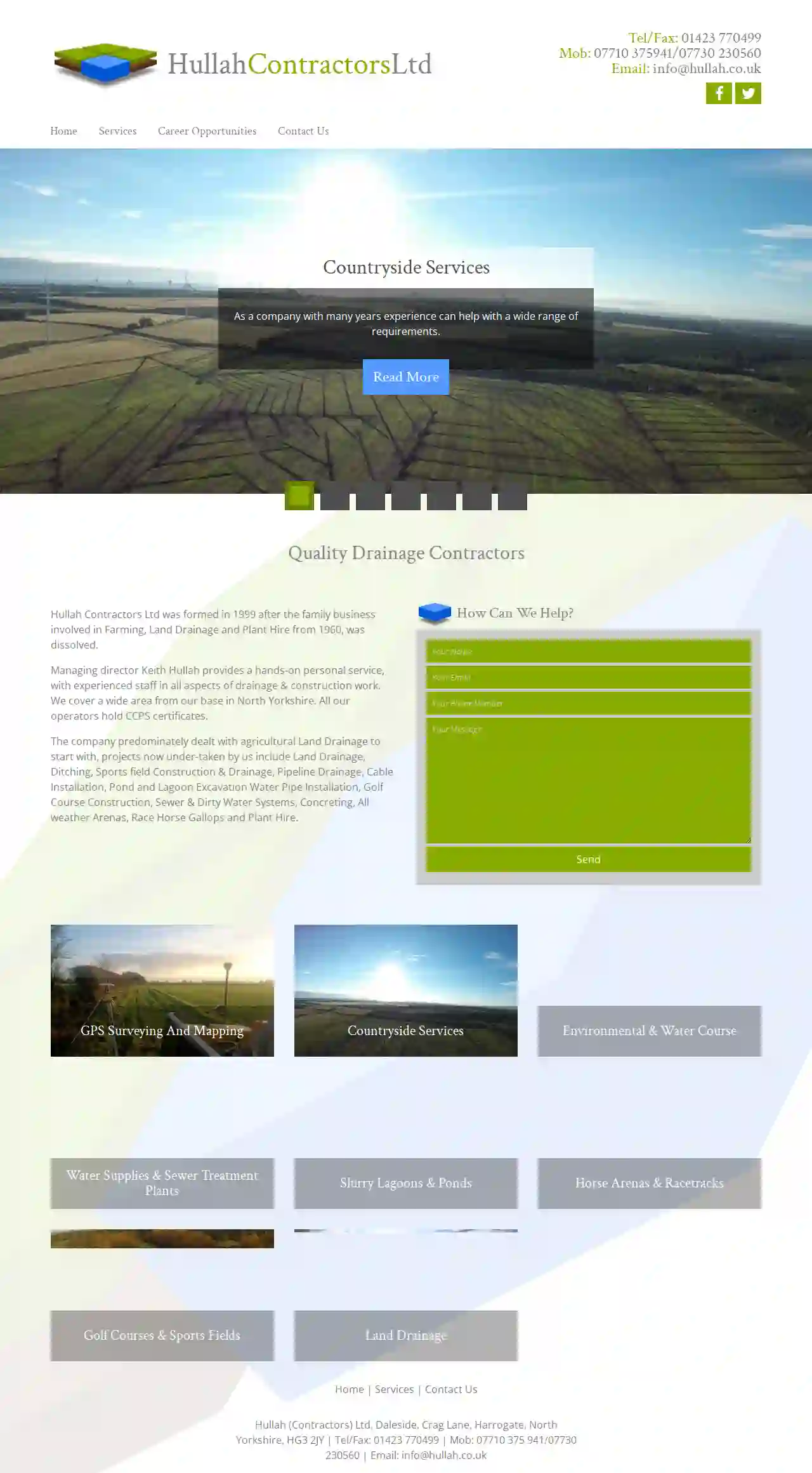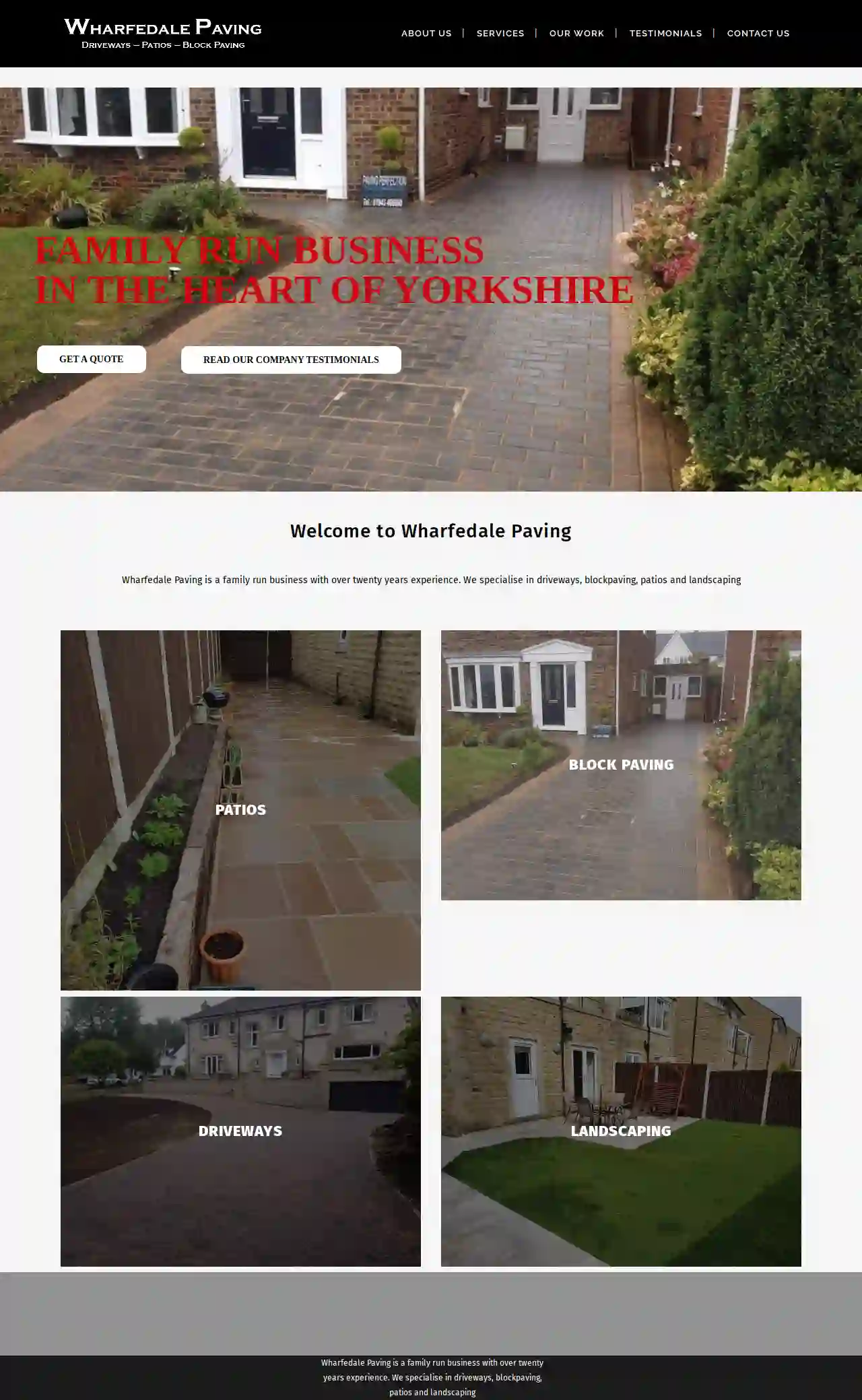Dirt Contractors Harrogate
Find Dirt Contractors in Harrogate
Get up to 3 Dirt Removal quotes for your project today! Compare profiles, reviews, accreditations, portfolio, etc... and choose the best deal.

Hullah Contractors Ltd
52 reviewsDaleside, Crag Lane, Harrogate, North Yorkshire, HG3 2JY, GBQuality Drainage Contractors Hullah Contractors Ltd was formed in 1999 after the family business involved in Farming, Land Drainage and Plant Hire from 1960, was dissolved. Managing director Keith Hullah provides a hands-on personal service, with experienced staff in all aspects of drainage & construction work. We cover a wide area from our base in North Yorkshire. All our operators hold CCPS certificates. The company predominately dealt with agricultural Land Drainage to start with, projects now under-taken by us include Land Drainage, Ditching, Sports field Construction & Drainage, Pipeline Drainage, Cable Installation, Pond and Lagoon Excavation Water Pipe Installation, Golf Course Construction, Sewer & Dirty Water Systems, Concreting, All weather Arenas, Race Horse Gallops and Plant Hire.
- Services
- Why Us?
- Gallery
Get Quote
SRM Joinery Ripon Harrogate
1Unit 2, Barugh Avenue, Barker Business Park, Melmerby, Ripon, North Yorkshire, HG4 5NB, GBWelcome To SRM Joinery & Construction SRM Joinery & Construction was formed with the simple belief that quality should never be compromised which continues to be the fundamental drive behind all of our work. Based in North Yorkshire, SRM offer high quality architectural joinery to clients throughout the UK; providing a diverse portfolio of traditional homes and contemporary new builds.
- Services
- Why Us?
- Testimonials
- Gallery
Get Quote
Wharfedale Paving
1Harrogate, GBWelcome to Wharfedale Paving Wharfedale Paving is a family run business with over twenty years experience. We specialise in driveways, blockpaving, patios and landscaping.
- Services
- Why Us?
- Gallery
Get Quote
Valley Gardens Harrogate
4.7Royal Pump Room Museum, Royal Parade, Harrogate, HG1 2SZ, GBHarrogate's Award Winning Park Valley Gardens is a 17-acre English Heritage Grade II listed park-land, themed gardens, floral displays and historic buildings. Located in the heart of Harrogate, it's a haven of beauty and tranquility, offering a variety of attractions for visitors of all ages. The gardens are continually being restored and regenerated with major works spearheaded by Friends of Valley Gardens, working with North Yorkshire Council who own and manage the gardens. At the heart of Valley Gardens is Bogs Field where it is believed that a greater number of different mineral water springs (now wells) come to the surface than any other place on earth. Thirty-six of Harrogate’s approximately one hundred mineral wells are found within the gardens, with no two being alike. The floral displays are spectacular and include magnificent seasonal dahlia and bedding flowers, that are re-planted throughout the year. The adjacent Pinewoods (http://www.pinewoodsconservationgroup.org.uk) is a further 96 acres of woodland with footpaths leading to RHS Garden Harlow Carr and Birk Crag an area of outstanding natural beauty. Valley Gardens was developed as an attractive walk for visitors to the Spa town of Harrogate, part of their health regime between taking the waters, and as a means of access to the mineral springs of Bogs Field. The waterside walk with flowers and trees became a place for promenading, socialising and taking exercise. Photographs of the gardens in the early 20th century testify to their enormous popularity with crowds around the tea room, boating lake and bandstand.
- Services
- Why Us?
- Gallery
Get Quote
Over 11,537+ Excavation Pros onboarded
Our excavation experts operate in Harrogate and beyond!
ExcavationHQ has curated and vetted the Best Excavation Businesses near Harrogate. Find the most trustworthy pro today.
Frequently Asked Questions About Dirt Contractors
- Dirt Type: Clay soils tend to settle slower than sandy soils due to their smaller particle size and higher water retention.
- Compaction: Proper compaction helps accelerate the settling process by reducing air pockets and increasing soil density.
- Moisture Content: Excessive moisture can prolong settling time, as the water needs to evaporate or drain away.
- Weather Conditions: Warm, dry weather promotes faster settling compared to cold or wet conditions.
- Online Directories: Utilize online directories like ExcavationHQ that specialize in connecting homeowners and businesses with qualified contractors. You can filter your search by location, service type, and read reviews from previous customers.
- Referrals: Ask friends, family, neighbors, or colleagues for recommendations based on their experiences with dirt contractors.
- Local Building Supply Stores: Inquire at local building supply stores, as they often have connections with contractors in the area.
- Online Reviews: Check online review platforms like Google My Business, Yelp, and Angie's List for insights into contractor reputations and customer feedback.
- Clean Fill: Consists of uncontaminated soil, rock, or gravel, free from organic matter, debris, or hazardous substances. Suitable for most construction and landscaping projects.
- Structural Fill: A compacted granular fill, typically gravel, crushed stone, or a mixture of both, used for structural support and drainage. Ideal for foundations, roadways, and retaining walls.
- Engineered Fill: A specifically designed and blended soil mix with controlled properties, such as compaction, drainage, or bearing capacity, tailored for particular applications.
- Unsuitable Fill: Materials like topsoil, organic matter, or contaminated soil that are not suitable for structural fill due to their potential for decomposition, settlement, or environmental concerns.
- Large-Scale Excavation: Assessing soil conditions, designing slopes, and ensuring stability for large excavation projects.
- Foundation Design: Determining the appropriate foundation type and depth based on soil bearing capacity and other factors.
- Retaining Walls: Designing retaining walls to stabilize slopes, prevent erosion, or create level areas on sloped sites.
- Slope Stability Analysis: Evaluating the stability of slopes and recommending measures to prevent landslides or erosion.
- Contaminated Soil Remediation: Developing and implementing plans to clean up contaminated soil.
How long does it take for dirt to settle after delivery?
How do I find a reputable dirt contractor near me?
What are the different types of fill dirt?
What is a soil engineer, and when might I need one?
How long does it take for dirt to settle after delivery?
- Dirt Type: Clay soils tend to settle slower than sandy soils due to their smaller particle size and higher water retention.
- Compaction: Proper compaction helps accelerate the settling process by reducing air pockets and increasing soil density.
- Moisture Content: Excessive moisture can prolong settling time, as the water needs to evaporate or drain away.
- Weather Conditions: Warm, dry weather promotes faster settling compared to cold or wet conditions.
How do I find a reputable dirt contractor near me?
- Online Directories: Utilize online directories like ExcavationHQ that specialize in connecting homeowners and businesses with qualified contractors. You can filter your search by location, service type, and read reviews from previous customers.
- Referrals: Ask friends, family, neighbors, or colleagues for recommendations based on their experiences with dirt contractors.
- Local Building Supply Stores: Inquire at local building supply stores, as they often have connections with contractors in the area.
- Online Reviews: Check online review platforms like Google My Business, Yelp, and Angie's List for insights into contractor reputations and customer feedback.
What are the different types of fill dirt?
- Clean Fill: Consists of uncontaminated soil, rock, or gravel, free from organic matter, debris, or hazardous substances. Suitable for most construction and landscaping projects.
- Structural Fill: A compacted granular fill, typically gravel, crushed stone, or a mixture of both, used for structural support and drainage. Ideal for foundations, roadways, and retaining walls.
- Engineered Fill: A specifically designed and blended soil mix with controlled properties, such as compaction, drainage, or bearing capacity, tailored for particular applications.
- Unsuitable Fill: Materials like topsoil, organic matter, or contaminated soil that are not suitable for structural fill due to their potential for decomposition, settlement, or environmental concerns.
What is a soil engineer, and when might I need one?
- Large-Scale Excavation: Assessing soil conditions, designing slopes, and ensuring stability for large excavation projects.
- Foundation Design: Determining the appropriate foundation type and depth based on soil bearing capacity and other factors.
- Retaining Walls: Designing retaining walls to stabilize slopes, prevent erosion, or create level areas on sloped sites.
- Slope Stability Analysis: Evaluating the stability of slopes and recommending measures to prevent landslides or erosion.
- Contaminated Soil Remediation: Developing and implementing plans to clean up contaminated soil.